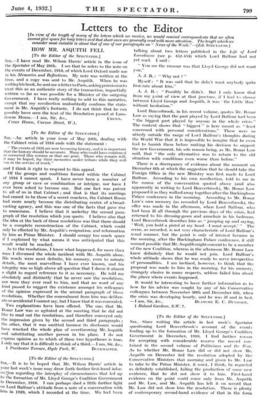[To the Editor of the SPECTATOR.]
Sta,—It is to be hoped that Mr. Wilson Harris article in your last week's issue may draw forth further first-hand infor- inst,ion regarding the interplay of circumstances that led up to the formation of Mr. Lloyd George's Coalition Government in December, 1916. I can perhaps shed a little further light on Lord Balfour's attitude from a note of a conversation with hint in 1929, which I recorded at the time. We had been talking about two letters published in the Life of Lord Lansdowne (see p. 452-454) which Lord Balfour had not yet read. I said : " You see the rumour was that Lloyd George did not want you."
A. J. B.: " Why not ? "
Myself : " It was said that he didn't want anybody quite first-rate about him."
A. J. B. : " Possibly he didn't. But I only know that from my point of view at that juncture, if I had to choose between Lloyd George and Asquith, it was ' the Little Man' without hesitation."
Lord Beaverbrook, in his recent volume, quotes Mr. Bonar Law as saying that the part played by Lord Balfour had been " the biggest part played by anyone in the whole crisis." The context shows that " biggest " is here meant as " least concerned with personal considerations." These were so utterly outside the range of Lord Balfour's thoughts during the World War that it is impossible to imagine that he even had to banish them before making his decision to support the new Government, his sole reason being, as Mr. Bonar said, that " the only alternative was to return to the old situation with conditions even worse than before."
There is a discrepancy of evidence about the moment on December 6th at which the suggestion that lie should take the Foreign Office in the new Ministry was first made to Lord Balfour. According to his own recollection, told to me in the course of the conversation quoted above (and also apparently in writing to Lord Beaverbrook), Mr. Honor Law proposed it as they walked away together after the Buckingham Palace conference in the morning. According to Mr. Bonar Law's own memory (as recorded by Lord Beaverbrook), the offer was made in the afternoon, when Lord Balfour, who had been ill all through the previous days of the crisis, had returned to his dressing-gown and armchair in his bedroom. Lord Beaverbrook describes him as " jumping up and saying, Well, you hold a pistol at my head—I must accept.' " The scene, as recorded, is not very characteristic of Lord Balfour's usual manner, but the point is only of interest because in the morning, after the Buckingham Palace conference, it still seemed possible that Mr. Asquith might consent to be a member of the new Coalition, whereas in the afternoon Mr. Bonar Law knew definitely that he would not join. Lord Balfour's whole attitude shows that he was ready to serve irrespective of personalities. I am inclined, however, to think that the
proposal was made to I in the morning, for his memory, strangely eluive in many respects, seldom failed him about the plates where events happened.
It would be interesting to have further information as to how far his advice was sought by any of his Conservative colleagues between November 30th and December 6th, when the crisis was developing hourly, and he was ill and in bed.




































 Previous page
Previous page